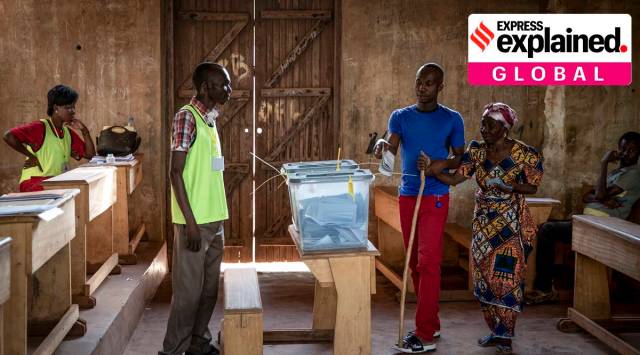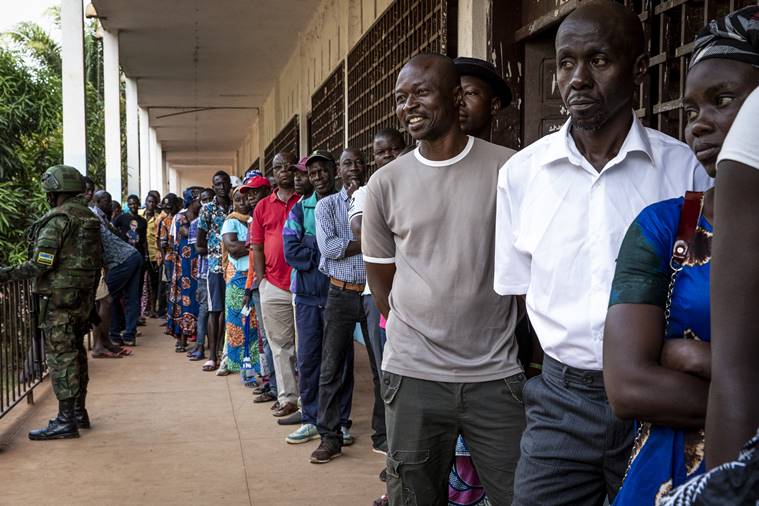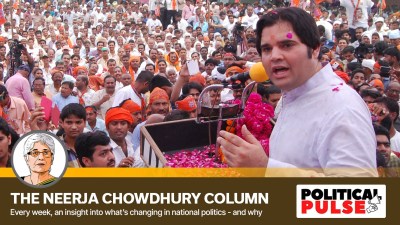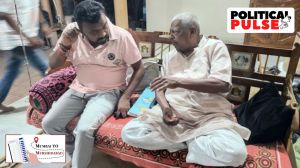- India
- International
Explained: 18 African nations went to the polls in 2020. Here’s what was at stake
The election processes in these countries have made for an interesting watch: totalitarian governments fought to retain control while pro-democracy activists have struggled to wrestle it from them.
 People cast their votes for presidential and legislative elections, at the Lycee Boganda polling station in the capital Bangui, Central African Republic Sunday, Dec. 27, 2020. (AP Photo)
People cast their votes for presidential and legislative elections, at the Lycee Boganda polling station in the capital Bangui, Central African Republic Sunday, Dec. 27, 2020. (AP Photo)The US presidential elections may have dominated global headlines, pushing electoral processes elsewhere around the world into the sidelines. But 2020 was a landmark year particularly for the African continent as 18 countries went to the polls, testing their domestic stability with ramifications for the continent at large.
The election processes in these countries have made for an interesting watch: totalitarian governments fought to retain control while pro-democracy activists have struggled to wrestle it from them. Regional violence, armed conflict, ethnic conflict, domestic socio-economic issues and climate change have also been some of the major factors that have both directly and indirectly impacted these processes.
While some elections have already taken place over the past few months, there are some that are ongoing and those that will spill over into the first half of 2021.
Burkina Faso: The 2020 Burkinabé general elections were held in the West African country in November this year, where incumbent president Roch Marc Christian Kaboré was reelected for a five-year term. Although Kaboré won 58% of the votes, critics and opposition figures had said that the voting process had not been fairly conducted.
While local news reports suggested that the coronavirus outbreak had prevented fewer people from heading to the polls, opposition figures had said that the election process had been marred by bribery and irregularities. In addition to this, Islamist violence in the country perpetrated by insurgents from neighbouring Mali had prevented at least one fifth of polling stations from opening, according to a Deutsche Welle news report.

Kaboré’s failures are stemming this Islamist violence and terrorism in the country had been at the forefront of issues at stake during this year’s elections.
Burundi: Held in May this year, the Burundian general elections saw Évariste Ndayishimiye of the ruling National Council for the Defense of Democracy – Forces for the Defense of Democracy party win the presidency with approximately 71% of the votes. Prior to the elections, the BBC had reported how the build-up to the polls had been marred with violence and accusations from critics and candidates that the process was not going to be free and fair.
According to Lewis Mudge, Central Africa director at Human Rights Watch, “the elections took place in a highly repressive environment with no independent international observers.” The international organization had reported that the process had witnessed the “arrests of opposition members, including candidates, and a crackdown on free speech.” The decision to hold the elections during the coronavirus pandemic also faced criticism in the country, in part because the country had consciously avoided imposing strict restrictions and mass political rallies had continued to be held in the run-up to the elections.
Cameroon: The long-standing Anglophone crisis in the Southern Cameroons region of Cameroon in Central Africa has dominated the parliamentary election process in the country. Separatists have been fighting the Cameroonian government in the country’s Northwest and Southwest Anglophone territories and the 2020 elections only intensified the conflict, with many calling for a boycott of the process.
In the summer of 2018, local and legislative elections that were originally due to be held in October were postponed for a year, with the Cameroonian government claiming that it would be difficult to concurrently hold presidential, legislative and municipal elections. But in July 2019, the government again pushed those elections to February 2020, without giving any reason for the decision, with the opposition and critics crying foul and many Ambazonians boycotting the elections.
In February 2020, parliamentary elections resulted in violence on both sides, with the government deploying hundreds of troops to combat separatists, who in turn had abducted several of the country’s politicians. The elections ended with the ruling Cameroon People’s Democratic Movement party retaining its majority in parliament.
Central African Republic (CAR): This week, the CAR voted in presidential elections that were marred with violence, resulting due to conflict between government and rebel forces. President Faustin-Archange Touadéra had sought a second term in office and had accused his predecessor, François Bozizé, of instigating a coup in collusion with rebel groups. Days before the elections on December 27, three UN peacekeepers were killed by assailants who are yet to be identified. While the opposition had called for a postponing of the elections, one that was rejected by the government, rebel groups urged people to not vote.
 People queue to cast their votes for presidential and legislative elections, at the Lycee Boganda polling station in the capital Bangui, Central African Republic, Sunday, Dec. 27, 2020. (AP Photo)
People queue to cast their votes for presidential and legislative elections, at the Lycee Boganda polling station in the capital Bangui, Central African Republic, Sunday, Dec. 27, 2020. (AP Photo)
There were also questions concerning the legitimacy of the elections, because thousands of citizens had reportedly not been given voter cards. The BBC reported the UN mission in the country saying that despite the violence and the closure of some polling stations, there was a large turnout in some areas of the country. In the run-up to the elections, Russia had said that President Touadéra’s government had sought military assistance from Moscow, following which 300 military instructors to CAR. But Russia has insisted that it is not involved in the violence that has occurred during the elections.
Chad: Legislative elections have been delayed five times since 2015 in the Republic of Chad, with President Idriss Deby Itno citing a lack of funds and the constant threats and instability posed by jihadist group Boko Haram. Originally scheduled to be held in August this year, the country’s Independent National Electoral Commission (Céni) announced in June that the legislative elections would be postponed once again, this time due to the coronavirus pandemic and the rainy season that was going to worsen road conditions in the country, and would in turn impact the ability of voters to register.
The country’s electoral commission had instead recommended holding the elections in April 2021, at the same time as the presidential elections. Observers have said however, that it is unlikely that these elections will be held next year either, because the president does not want his leadership to be contested. Deby came to power by force in 1990 and has not yet openly announced whether he will contest for a sixth term.
Comoros: The island nation of the Comoros in the Indian Ocean has witnessed a violent political history since it gained independence in 1974. There have been 20 attempted coups, out of which four were successfully implemented. When Comoros President Azali Assoumani first came to power, he himself had staged a coup, ruling the country from 1999 to 2006. In 2016, when he came to power once again, the election process was marred with irregularities and violence. In January 2020, he once again emerged victorious in the country’s parliamentary elections, one that was boycotted by opposition parties. These opposition parties had said that elections had been undemocratic and not transparent. Opposition parties had also alleged that voter-turnout was significantly lower than the figure of 61.5 percent that was presented by the electoral commission, saying that the country’s citizens “rejected” Azali’s “dictatorship regime by deserting the polling stations.”
Ethiopia: General elections to elect officials to the House of Peoples’ Representatives, the lower chamber of the Ethiopian Federal Parliamentary Assembly, the legislative body of the country, were originally scheduled to be held in Ethiopia in August 2020. The Covid-19 pandemic however, forced the lower chamber to consider postponing the election process. In May, the house voted to postpone the country’s elections to an unspecified date in 2021. But in December, the National Election Board of Ethiopia announced that it would take place on 5 June 2021.
Ethiopia is currently in the midst of a civil war that started in November 2020, between the powerful Tigray Regional Government led by the Tigray People’s Liberation Front (TPLF) and forces supporting Ethiopian Prime Minister Abiy Ahmed. The civil war has led to the suspension of communication lines and transport, violence and displacement of civilians. Thousands of the country’s citizens, particularly from the north, have been forced to flee their homes and seek refuge in neighbouring countries like Sudan. The conflict has potential to impact the Horn of Africa at large and military and economic interests of major powers like the US, China and Russia in the region.
Gabon: Gabon was scheduled to hold parliamentary elections in April 2020 in the Gabonese department of Lékoni-Lékori. However, that has been postponed due to the coronavirus pandemic.
Ghana: In mid-December, Ghana’s incumbent President Nana Akufo-Addo won a second term as president. Akufo-Addo had come into power in a landslide victory in 2016, promising to rid the country of corruption. But since then, critics have accused him of political interference, and of failing one of his major campaign promises of installing hospitals in each of Ghana’s 216 districts. But in his last term, Akufo-Addo had also fulfilled his promise of abolishing fees for high school education.
Nana Addo Dankwa Akufo-Addo is President-Elect of the Republic of Ghana pic.twitter.com/qlGePJaEve
— Electoral Commission Of Ghana (@ECGhanaOfficial) December 22, 2020
The victory comes at a time when the coronavirus pandemic has hit the country’s economy hard and eastern Ghana’s Volta region is witnessing renewed separatist upheaval, with separatists demanding the independence of Western Togoland.
Guinea: In October 2020, President Alpha Condé won a controversial third term in office amid violent protests across Guinea. After election results were announced, opposing candidates, including former prime minister Cellou Dalein Diallo who was also running, challenged the results, alleging widespread fraud. The violence that ensued resulted in the deaths of at least 30 people, days after Condé announced his win.
The Constitution of Guinea limits a president to only two terms. However, earlier this year in March, amendments were passed in a controversial constitutional referendum that reset the presidential terms, allowing Condé to run for a third term. In the months since Condé announcement, the country has witnessed widespread violence. Protests have been ongoing throughout the year, with the country’s security forces coming down heavily on protesting civilians, that has also resulted in deaths.
Ivory Coast: In November, the Republic of Côte d’Ivoire’s President Alassane Ouattara won a controversial third term in office in an election that was boycotted by the opposition. But soon after, the Ivorian opposition announced that it was creating a transitional government which would be responsible for organising a new election. Political clashes and ensuing violence was reported in the run up to and even after the results were declared.
According to a BBC report, opposition figures had said it was illegal for Ouattara to run for a third term as it was a violation of rules. This is disputed by the president’s supporters who cite a constitutional change instituted in 2016 according to which they say means Ouattara’s first term effectively did not count.
Independent watchdogs and advocacy groups had said that the election was marred by intimidation, violence and electoral malpractice and that a large number of voters were unable to vote because polling stations were closed. The BBC reported that polling stations in opposition strongholds were also ransacked and property burned. Since Ouattara’s announcement in July that he would run for office again, more than 3,000 people have been killed.
Mali: After being postponed from 2018 to 2019, to March 2020, parliamentary elections were held in Mali, with a second round held a few weeks later in April. According to a report by the Voice of America, these are the first elections to fill Mali’s 147-seat parliament since 2013. The elections were marred by violence that occurred in the north and center of the country. In March, leader of the opposition Soumaila Cissé was kidnapped three days prior to the elections. Then, an al-Qaeda-aligned militant group engaged in roadside bombings and attacks on soldiers as well as civillians.
The landlocked country has been mired in conflict for more than a decade and in addition to jihadist terror, it has also been witnessing inter-ethnic violence. President Ibrahim Boubacar Keïta, who served as the president of Mali from September 2013 to August 2020, was forced to resign after being taken captive by factions of the Malian Armed Forces in a coup d’état.
Namibia: Local and regional elections were held in Namibia in November 2020 to elect new local and regional councils. They were last held in 2015.
Niger: The Sahel state of Niger went to the polls on December 27 in a historic election amid violent jihadist insurgency. These elections are landmark because it could lead to Niger’s first peaceful transition of power since it gained independence from France 60 years ago. Results could be in within days, but the constitutional court will take longer to ratify them. The winner would have to obtain 50 percent of the votes, otherwise the process would involve a run-off in February 2021 involving the top two candidates.
.@antonioguterres commends the Government & the people of Niger for their efforts to ensure the timely holding of elections despite significant security & humanitarian challenges, amid the #COVID19 pandemic: https://t.co/mqUnAVPZIR
— UN Spokesperson (@UN_Spokesperson) December 26, 2020
Over the past few years, Niger has been facing threats from armed groups as well as jihadist groups like Boko Haram. In December this year, 27 people died in an attack, responsibility for which was claimed by Boko Haram. While security has been a pressing concern during these elections, local news reports suggested that despite fears of violence and other threats, incidents have been relatively few during the elections.
Tanzania: General elections were held in Tanzania in October 2020 to elect the President and National Assembly and incumbent John Magufuli was re-elected with a landslide victory. Opposition leaders had called the elections fraudulent, claiming that “state machinery” had been used “to cling to power”, according to a BBC report. Some opposition leaders also claimed that ballot boxes had been tampered with, but these claims were dismissed as false by the head of the National Electoral Commission, according to the report.
In the run-up to the elections, Human Rights Watch had reported that “police arbitrarily arrested and detained scores of opposition party leaders and supporters” and “the authorities suspended television and radio stations, censored mobile phone communication, and blocked social media”. Opposition leaders had reportedly been arrested and attacked and a ban on rallies was also instituted prior to the elections, according to an Al Jazeera report.
Human Rights Watch had also reported that on the eve of elections in October, police had fired live ammunition into crowds on the semi-autonomous island archipelago of Zanzibar, where at least three people were killed.
Somalia: Presidential elections were scheduled to be held in Somalia in December 2020 but they have been postponed to February 2021 due to several factors. While the coronavirus outbreak is a major cause, others include the widespread famine that occurred due to desert locusts and because of the violence perpetrated by al-Shabaab insurgents, a jihadist fundamentalist group in East Africa.
There are concerns that the instability in Ethiopia could seep into Somalia and impact the election process and the stability of the country as well. Domestic disputes between the federal government, states and tribal clans could also result in unrest. According to a Brookings analysis, the Trump administration’s decision to withdraw the majority of U.S. special operations forces from the country by January 2021, just before the elections, may also result in weakened security, which may give more impetus to al-Shabab insurgents.
Somaliland: Although not internationally recognised, Somaliland is a territory that broke away from Somalia in 1991 and has a working political system, its own government institutions, an independent police force and its own currency. The last parliamentary polls were held in 2005 and since then, have been rescheduled several times. It was then decided that polls would be held in 2019, but they were postponed to the end of 2020. Now however, that date has been revised to May 2021.
Seychelles: The Seychellois general elections were held in October 2020, in what was a landmark event. For the first time since 1977, the opposition took power in the Seychelles with Anglican priest Wavel Ramkalawan winning the elections. Analysts believe that the political party that former president Danny Faure belonged to, the United Seychelles Party, was unable to win these elections because of the political party’s past involvement in political murders, torture and corruption.
Togo: Presidential elections were held in the West African nation of Togo in February 2020, where Incumbent president Faure Gnassingbé of the ruling Union for the Republic party was re-elected for his fourth term in office with 71% of the votes. But the process was marred with claims of electoral fraud following accusations by opposition leader Agbéyomé Kodjo.
According to a BBC report, Kodjo, former prime minister and head of the national assembly, had accused government authorities of setting up fake polling stations in these elections and of engaging in ballot tampering and of making people cast multiple votes for Gnassingbé’s. In the run-up to the elections in February, international observers had called out the Togolese government for shutting down internet services in the capital Lomé and in other parts of the country.
EXPRESS OPINION
Apr 25: Latest News
- 01
- 02
- 03
- 04
- 05









































